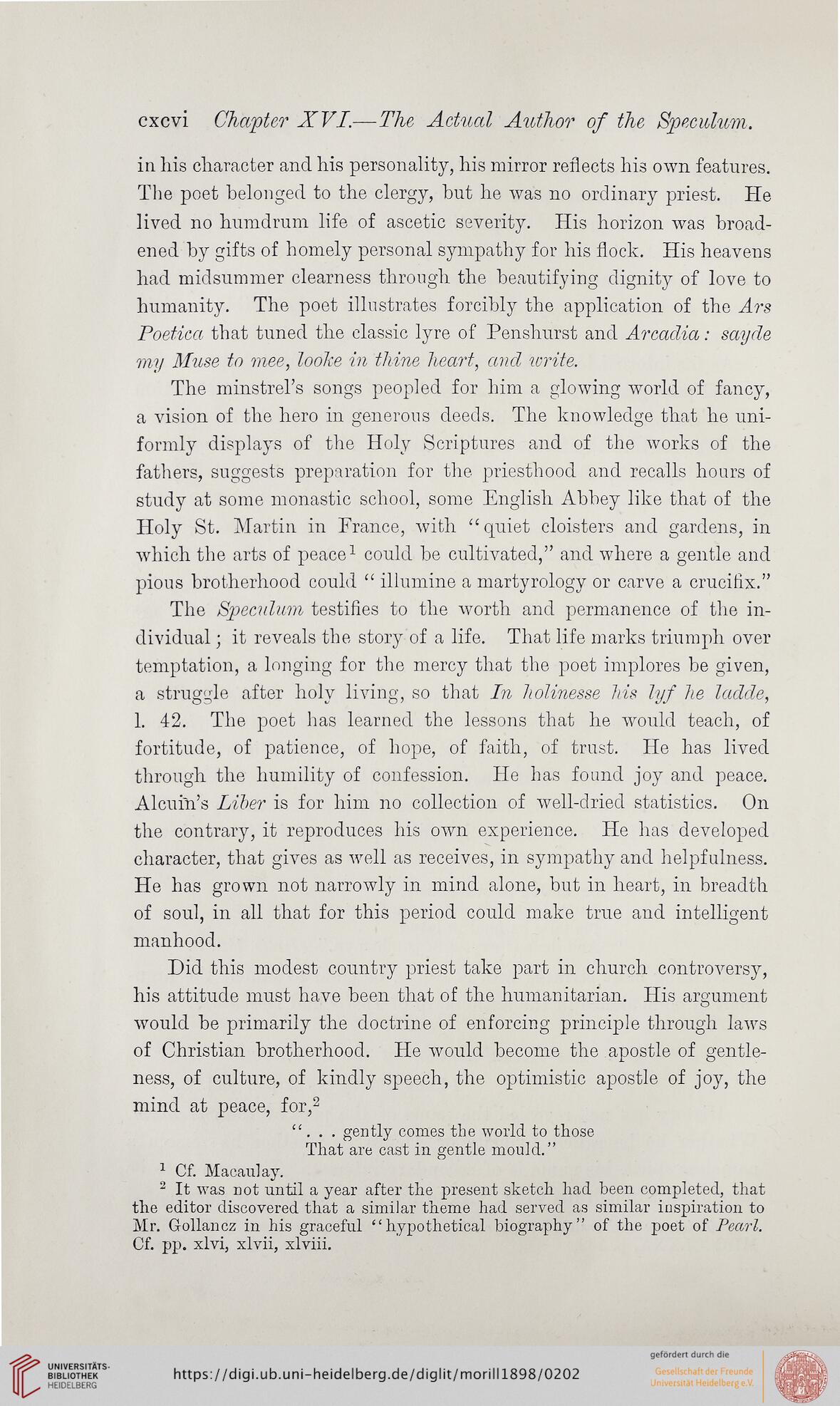cxcvi Chapter XVI.—The Actual Author of the Speculum.
in his character and his personality, his mirror reflects his own features.
The poet belonged to the clergy, but he was no ordinary priest. He
lived no humdrum life of ascetic severity. His horizon was broad-
ened by gifts of homely personal sympathy for his flock. His heavens
had midsummer clearness through the beautifying dignity of love to
humanity. The poet illustrates forcibly the application of the Ars
Poetica that tuned the classic lyre of Penshurst and Arcadia: sayde
my Muse to mee, looks in thine heart, and write.
The minstrel’s songs peopled for him a glowing world of fancy,
a vision of the hero in generous deeds. The knowledge that he uni-
formly displays of the Holy Scriptures and of the works of the
fathers, suggests preparation for the priesthood and recalls hours of
study at some monastic school, some English Abbey like that of the
Holy St. Martin in France, with “ quiet cloisters and gardens, in
which the arts of peace1 could be cultivated,” and where a gentle and
pious brotherhood could “ illumine a martyrology or carve a crucifix.”
The Speculum testifies to the worth and permanence of the in-
dividual ; it reveals the story of a life. That life marks triumph over
temptation, a longing for the mercy that the poet implores be given,
a struggle after holy living, so that In holinesse his lyf he ladde,
1. 42. The poet has learned the lessons that he would teach, of
fortitude, of patience, of hope, of faith, of trust. He has lived
through the humility of confession. He has found joy and peace.
Alenin’s Liber is for him no collection of well-dried statistics. On
the contrary, it reproduces his own experience. He has developed
character, that gives as well as receives, in sympathy and helpfulness.
He has grown not narrowly in mind alone, but in heart, in breadth
of soul, in all that for this period could make true and intelligent
manhood.
Did this modest country priest take part in church controversy,
his attitude must have been that of the humanitarian. His argument
would be primarily the doctrine of enforcing principle through laws
of Christian brotherhood. He would become the apostle of gentle-
ness, of culture, of kindly speech, the optimistic apostle of joy, the
mind at peace, for,2
“ . . . gently comes the world to those
That are cast in gentle mould.”
1 Cf. Macaulay.
2 It was not until a year after the present sketch had been completed, that
the editor discovered that a similar theme had served as similar inspiration to
Mr. Gollancz in his graceful “hypothetical biography” of the poet of Pearl.
Cf. pp. xlvi, xlvii, xlviii.
in his character and his personality, his mirror reflects his own features.
The poet belonged to the clergy, but he was no ordinary priest. He
lived no humdrum life of ascetic severity. His horizon was broad-
ened by gifts of homely personal sympathy for his flock. His heavens
had midsummer clearness through the beautifying dignity of love to
humanity. The poet illustrates forcibly the application of the Ars
Poetica that tuned the classic lyre of Penshurst and Arcadia: sayde
my Muse to mee, looks in thine heart, and write.
The minstrel’s songs peopled for him a glowing world of fancy,
a vision of the hero in generous deeds. The knowledge that he uni-
formly displays of the Holy Scriptures and of the works of the
fathers, suggests preparation for the priesthood and recalls hours of
study at some monastic school, some English Abbey like that of the
Holy St. Martin in France, with “ quiet cloisters and gardens, in
which the arts of peace1 could be cultivated,” and where a gentle and
pious brotherhood could “ illumine a martyrology or carve a crucifix.”
The Speculum testifies to the worth and permanence of the in-
dividual ; it reveals the story of a life. That life marks triumph over
temptation, a longing for the mercy that the poet implores be given,
a struggle after holy living, so that In holinesse his lyf he ladde,
1. 42. The poet has learned the lessons that he would teach, of
fortitude, of patience, of hope, of faith, of trust. He has lived
through the humility of confession. He has found joy and peace.
Alenin’s Liber is for him no collection of well-dried statistics. On
the contrary, it reproduces his own experience. He has developed
character, that gives as well as receives, in sympathy and helpfulness.
He has grown not narrowly in mind alone, but in heart, in breadth
of soul, in all that for this period could make true and intelligent
manhood.
Did this modest country priest take part in church controversy,
his attitude must have been that of the humanitarian. His argument
would be primarily the doctrine of enforcing principle through laws
of Christian brotherhood. He would become the apostle of gentle-
ness, of culture, of kindly speech, the optimistic apostle of joy, the
mind at peace, for,2
“ . . . gently comes the world to those
That are cast in gentle mould.”
1 Cf. Macaulay.
2 It was not until a year after the present sketch had been completed, that
the editor discovered that a similar theme had served as similar inspiration to
Mr. Gollancz in his graceful “hypothetical biography” of the poet of Pearl.
Cf. pp. xlvi, xlvii, xlviii.




